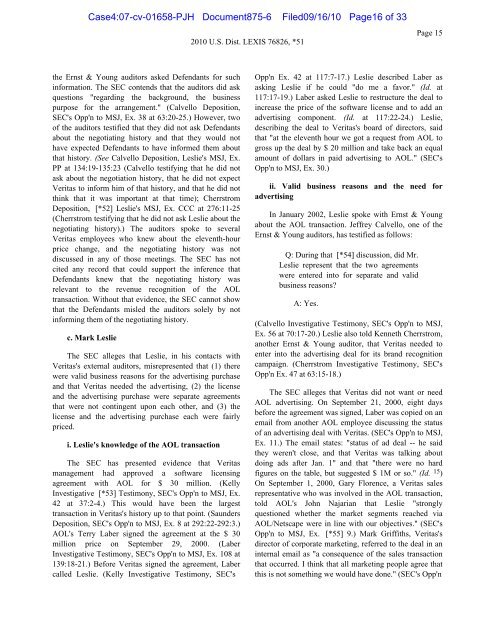exhibit 2 - SAP Lawsuit Portal
exhibit 2 - SAP Lawsuit Portal
exhibit 2 - SAP Lawsuit Portal
You also want an ePaper? Increase the reach of your titles
YUMPU automatically turns print PDFs into web optimized ePapers that Google loves.
Case4:07-cv-01658-PJH Document875-6 Filed09/16/10 Page16 of 33<br />
the Ernst & Young auditors asked Defendants for such<br />
information. The SEC contends that the auditors did ask<br />
questions "regarding the background, the business<br />
purpose for the arrangement." (Calvello Deposition,<br />
SEC's Opp'n to MSJ, Ex. 38 at 63:20-25.) However, two<br />
of the auditors testified that they did not ask Defendants<br />
about the negotiating history and that they would not<br />
have expected Defendants to have informed them about<br />
that history. (See Calvello Deposition, Leslie's MSJ, Ex.<br />
PP at 134:19-135:23 (Calvello testifying that he did not<br />
ask about the negotiation history, that he did not expect<br />
Veritas to inform him of that history, and that he did not<br />
think that it was important at that time); Cherrstrom<br />
Deposition, [*52] Leslie's MSJ, Ex. CCC at 276:11-25<br />
(Cherrstrom testifying that he did not ask Leslie about the<br />
negotiating history).) The auditors spoke to several<br />
Veritas employees who knew about the eleventh-hour<br />
price change, and the negotiating history was not<br />
discussed in any of those meetings. The SEC has not<br />
cited any record that could support the inference that<br />
Defendants knew that the negotiating history was<br />
relevant to the revenue recognition of the AOL<br />
transaction. Without that evidence, the SEC cannot show<br />
that the Defendants misled the auditors solely by not<br />
informing them of the negotiating history.<br />
c. Mark Leslie<br />
The SEC alleges that Leslie, in his contacts with<br />
Veritas's external auditors, misrepresented that (1) there<br />
were valid business reasons for the advertising purchase<br />
and that Veritas needed the advertising, (2) the license<br />
and the advertising purchase were separate agreements<br />
that were not contingent upon each other, and (3) the<br />
license and the advertising purchase each were fairly<br />
priced.<br />
i. Leslie's knowledge of the AOL transaction<br />
The SEC has presented evidence that Veritas<br />
management had approved a software licensing<br />
agreement with AOL for $ 30 million. (Kelly<br />
Investigative [*53] Testimony, SEC's Opp'n to MSJ, Ex.<br />
42 at 37:2-4.) This would have been the largest<br />
transaction in Veritas's history up to that point. (Saunders<br />
Deposition, SEC's Opp'n to MSJ, Ex. 8 at 292:22-292:3.)<br />
AOL's Terry Laber signed the agreement at the $ 30<br />
million price on September 29, 2000. (Laber<br />
Investigative Testimony, SEC's Opp'n to MSJ, Ex. 108 at<br />
139:18-21.) Before Veritas signed the agreement, Laber<br />
called Leslie. (Kelly Investigative Testimony, SEC's<br />
2010 U.S. Dist. LEXIS 76826, *51<br />
Opp'n Ex. 42 at 117:7-17.) Leslie described Laber as<br />
asking Leslie if he could "do me a favor." (Id. at<br />
117:17-19.) Laber asked Leslie to restructure the deal to<br />
increase the price of the software license and to add an<br />
advertising component. (Id. at 117:22-24.) Leslie,<br />
describing the deal to Veritas's board of directors, said<br />
that "at the eleventh hour we got a request from AOL to<br />
gross up the deal by $ 20 million and take back an equal<br />
amount of dollars in paid advertising to AOL." (SEC's<br />
Opp'n to MSJ, Ex. 30.)<br />
ii. Valid business reasons and the need for<br />
advertising<br />
In January 2002, Leslie spoke with Ernst & Young<br />
about the AOL transaction. Jeffrey Calvello, one of the<br />
Ernst & Young auditors, has testified as follows:<br />
Q: During that [*54] discussion, did Mr.<br />
Leslie represent that the two agreements<br />
were entered into for separate and valid<br />
business reasons?<br />
A: Yes.<br />
Page 15<br />
(Calvello Investigative Testimony, SEC's Opp'n to MSJ,<br />
Ex. 56 at 70:17-20.) Leslie also told Kenneth Cherrstrom,<br />
another Ernst & Young auditor, that Veritas needed to<br />
enter into the advertising deal for its brand recognition<br />
campaign. (Cherrstrom Investigative Testimony, SEC's<br />
Opp'n Ex. 47 at 63:15-18.)<br />
The SEC alleges that Veritas did not want or need<br />
AOL advertising. On September 21, 2000, eight days<br />
before the agreement was signed, Laber was copied on an<br />
email from another AOL employee discussing the status<br />
of an advertising deal with Veritas. (SEC's Opp'n to MSJ,<br />
Ex. 11.) The email states: "status of ad deal -- he said<br />
they weren't close, and that Veritas was talking about<br />
doing ads after Jan. 1" and that "there were no hard<br />
figures on the table, but suggested $ 1M or so." (Id. 15 )<br />
On September 1, 2000, Gary Florence, a Veritas sales<br />
representative who was involved in the AOL transaction,<br />
told AOL's John Najarian that Leslie "strongly<br />
questioned whether the market segments reached via<br />
AOL/Netscape were in line with our objectives." (SEC's<br />
Opp'n to MSJ, Ex. [*55] 9.) Mark Griffiths, Veritas's<br />
director of corporate marketing, referred to the deal in an<br />
internal email as "a consequence of the sales transaction<br />
that occurred. I think that all marketing people agree that<br />
this is not something we would have done." (SEC's Opp'n


